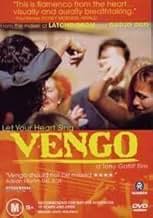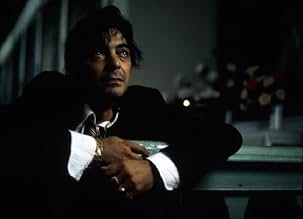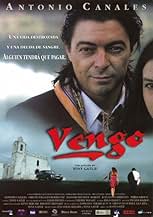Vengo
- 2000
- Tous publics
- 1h 30min
NOTE IMDb
7,2/10
3,1 k
MA NOTE
Ajouter une intrigue dans votre langueVengo is a majestic ode to the artistry and magic of flamenco dancing, set against the compelling backdrop of two gypsy families locked in an age old struggle for power.Vengo is a majestic ode to the artistry and magic of flamenco dancing, set against the compelling backdrop of two gypsy families locked in an age old struggle for power.Vengo is a majestic ode to the artistry and magic of flamenco dancing, set against the compelling backdrop of two gypsy families locked in an age old struggle for power.
- Réalisation
- Scénario
- Casting principal
- Récompenses
- 2 victoires et 1 nomination au total
Antonio Dechent
- Primo Alejandro
- (as Antonio Pérez Dechent)
Juan-Luis Barrios Llorente
- Primo Caravaca 2
- (as Juan Luis Barrios Llorente)
Avis à la une
Indeed, not a bad documentary (barely a real film, the plot is just an excuse to the connection of the different flamenco scenes). Antonio Canales is surprisingly good as Caco, and the other characters are of no relevance to the story whatsoever. Orestes, Caco's nephew with cerebral palsy, is actually Antonio Canales' nephew. Undoubtable epic flavor in this escape/flamenco journey. Good details, as the nice landscapes in Cadiz and the references to Caco's relative "exiled" in the Spanish cities of North Africa. Great and not so commercial flamenco singers, such as La Paquera(R.I.P) and La Caita. Special attention to the closing song, "Naci en Alamo".
The story is told by images and music. A real semiotic statement and another ode to the love of music by the gypsie people. The film tells you a story about a vendetta and the consequenses of it, played by real people with deep human emotions. A honest document, another masterpiece after Gadjo Dillo and Lacho Drome. I love this movie and it made me laugh and weep, also I couldn't sit still during the music scenes with authentic flamengo/gypsie music. Any music lover should see this film to explore the roots of spanish music.
8=G=
"Vengo" is a wonderfully alive feast of the flamenco music, dance, and rhythms of the contemporary Andalusia gypsies of Southern Spain built on a ominously rumbling story of a blood feud and death. Not your usual movie fare, "Vengo" divides its time equally between musical ethnic folk singing and dancing from gala festivities to impromptu "jam" sessions to funeral laments while inching the family feud story slowly forward with the kinetic tempos of flamenco rhythms everpresent. More art than entertainment, "Vengo" will appeal most to those into foreign or ethnic films with bold musical underpinnings. Those who enjoy "Vengo" might want to check out "Flamenco (de Carlos Saura)", "Assassination Tango", "Tango, no me dejes nunca", and the like. (B+)
For me there's nothing better than a film about the affairs of exotic people from other lands that is full of spirited music, no matter how flimsy the plot. "Vengo" is an exemplary case. It is the latest in a series of films about Romany people and their music made by Tony Gatlif. He brings impeccable credentials to the task: born in Algeria, raised in Marseille, his mother is Roma and his father a Berber. His best known film is the 1993 homage to Roma music, "Latcho Drom" (Safe Journey), which I have yet to see. "Vengo" is set in Andalusia, in southern Spain, in the city of Seville and surrounding villages. Here a rich tradition of Berber, Romany and Jewish origins has shaped the culture and given the world a distinctive music: flamenco. This film is best viewed as a flamenco concert featuring a number of different singers, instrumentalists, dancers and ensembles, most of whom are outrageously good. The musical numbers are connected by an insubstantial narrative, a loosely unfolding story of a blood feud, a dialectic of deaths, between two rural Roma families. Caco (the flamenco dancer, Antonio Canales, who doesn't get to dance at all here) is a bereaved nightclub owner and heavy boozer whose teenage daughter was killed by members of the Caravaca family. In return Caco's brother Mario killed a Caravaca man and is hiding in Morocco. The Caravacas now demand their turn for revenge and, in Mario's absence, let out word that they plan to murder Mario's son, Diego (Orestes Villason Rodriguez), a 20-something man who suffers from cerebral palsy. Caco dearly loves and dotes on Diego, his nephew, and is set into a crazed state by this news. The story moves toward a tragic sacrificial climax. The plot does serve to convey the essential truth that grounds the passion of these people: that suffering and death itself are inevitable counterpoints to love and family loyalty. This backdrop gives embodiment to the deep emotions expressed in the music. There is also a single very humorous scene featuring cells phones, perhaps the funniest bit about these obnoxious instruments in all of filmdom. The turn contributed by Rodriguez (as Diego) is impressive; it is welcome indeed to see a person with cerebral palsy act a major role, especially when the performance is built much more on humanity than on handicap. (In Spanish)
A family feud involving honor and integrity is at the center of this intriguing film directed by Tony Gatlif. We are taken to meet Caco, a man that is being threatened by an opposing clan because his brother Mario killed one of the Caracava men, something that will not be forgotten until justice is done. Since Mario is hiding in Morocco, Caco is a marked man because he represents his brother, the assassin.
Caco, is a man who loves his nephew Diego, that suffers from cerebral palsy. Diego, who is Mario's son, enjoys women like other normal young men his own age. Caco takes care for Diego to have a discreet encounter with a beautiful prostitute, la Catalana. Caco learns how the Caracavas are vowing to avenge their dead brother by sacrificing Diego.
"Vengo" mixes the action with music, song and dance performed by some of the best flamenco interpreters of the genre. Antonio Canales does a good job in his take of Caco, the head of his clan, and the loving uncle of Diego. Orestes Villason Rodriguez, who is physically handicapped, appears as Diego, who like any other member of this clan, loves his music and women with the same passion. Antonio Dechent appears as Alejandro, Caco's right hand man.
Tony Gatlif brings all the colors of Andalucia to a film and does justice to some of that exotic music and mixes the local gypsy music with Moroccan performers that add color to the movie.
Caco, is a man who loves his nephew Diego, that suffers from cerebral palsy. Diego, who is Mario's son, enjoys women like other normal young men his own age. Caco takes care for Diego to have a discreet encounter with a beautiful prostitute, la Catalana. Caco learns how the Caracavas are vowing to avenge their dead brother by sacrificing Diego.
"Vengo" mixes the action with music, song and dance performed by some of the best flamenco interpreters of the genre. Antonio Canales does a good job in his take of Caco, the head of his clan, and the loving uncle of Diego. Orestes Villason Rodriguez, who is physically handicapped, appears as Diego, who like any other member of this clan, loves his music and women with the same passion. Antonio Dechent appears as Alejandro, Caco's right hand man.
Tony Gatlif brings all the colors of Andalucia to a film and does justice to some of that exotic music and mixes the local gypsy music with Moroccan performers that add color to the movie.
Le saviez-vous
- AnecdotesClosed the Venice Film Festival in 2000.
- Bandes originalesFusion Flamenco Soufi
Written by Tomatito, Sheikh Ahmad Al Tuni and Tony Gatlif
Guitars: Tomatito
Percussion Ramón Suárez Escobar and Israel Suárez Escobar
Violin: Bernardo Fernández Calvez
Palmas: Rafael García Serrano 'El Electrico' and Antonio Torrez Fernández
Singer: Sheikh Ahmad Al Tuni
Kamarga: Fath Abbas Hashem and Mostafa Benhmad
Oud: Mohamed Mahmoud Abdel Megid
Rapp: Rashidi Khamas Rashidi
Derbouka: Solman Al Tuni and Kamal Daas
Duff: Abbas Baktuari
Meilleurs choix
Connectez-vous pour évaluer et suivre la liste de favoris afin de recevoir des recommandations personnalisées
- How long is Vengo?Alimenté par Alexa
Détails
- Date de sortie
- Pays d’origine
- Langues
- Aussi connu sous le nom de
- Vengo del Moro
- Lieux de tournage
- Sociétés de production
- Voir plus de crédits d'entreprise sur IMDbPro
Box-office
- Montant brut aux États-Unis et au Canada
- 124 994 $US
- Week-end de sortie aux États-Unis et au Canada
- 5 704 $US
- 9 sept. 2001
- Durée
- 1h 30min(90 min)
- Couleur
- Mixage
- Rapport de forme
- 2.35 : 1
Contribuer à cette page
Suggérer une modification ou ajouter du contenu manquant


















